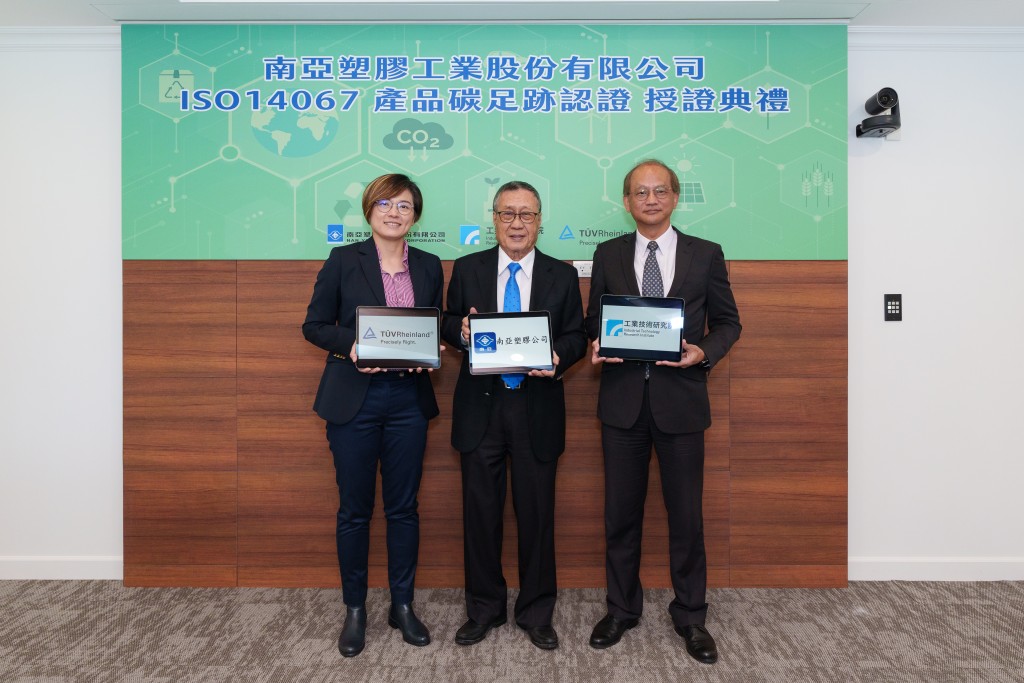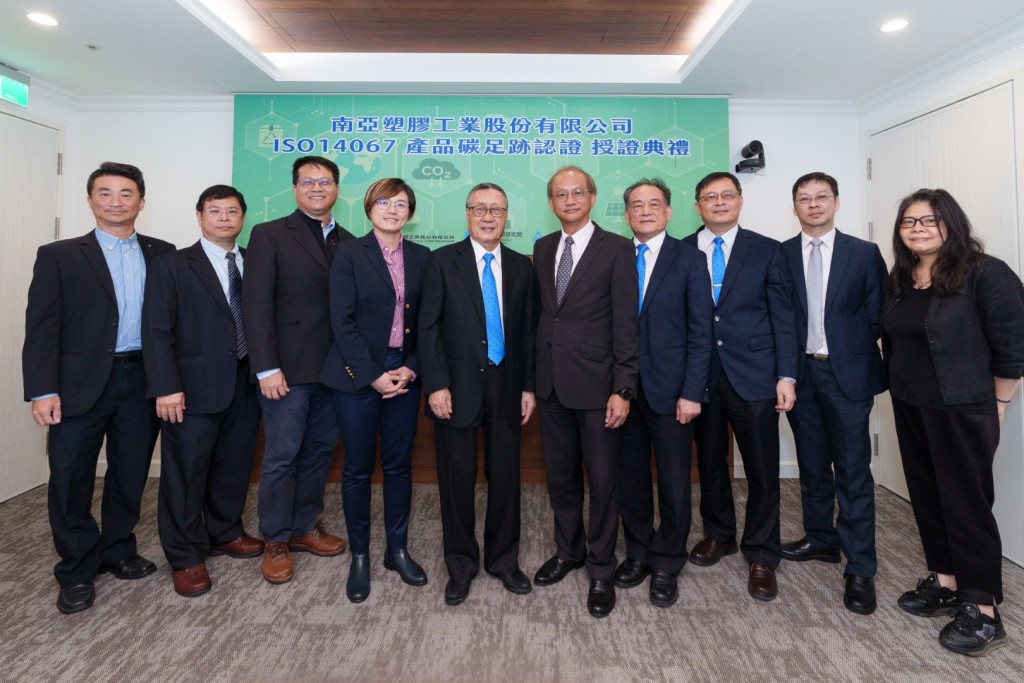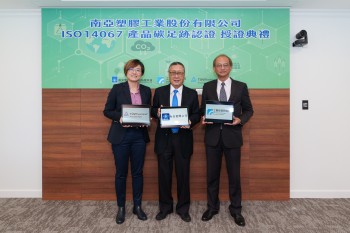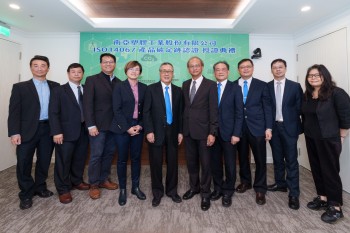Nan Ya Sets New Green Benchmark in Plastics Industry with 13 Product Carbon Footprint Verifications
Taiwan | 29 November, 2023
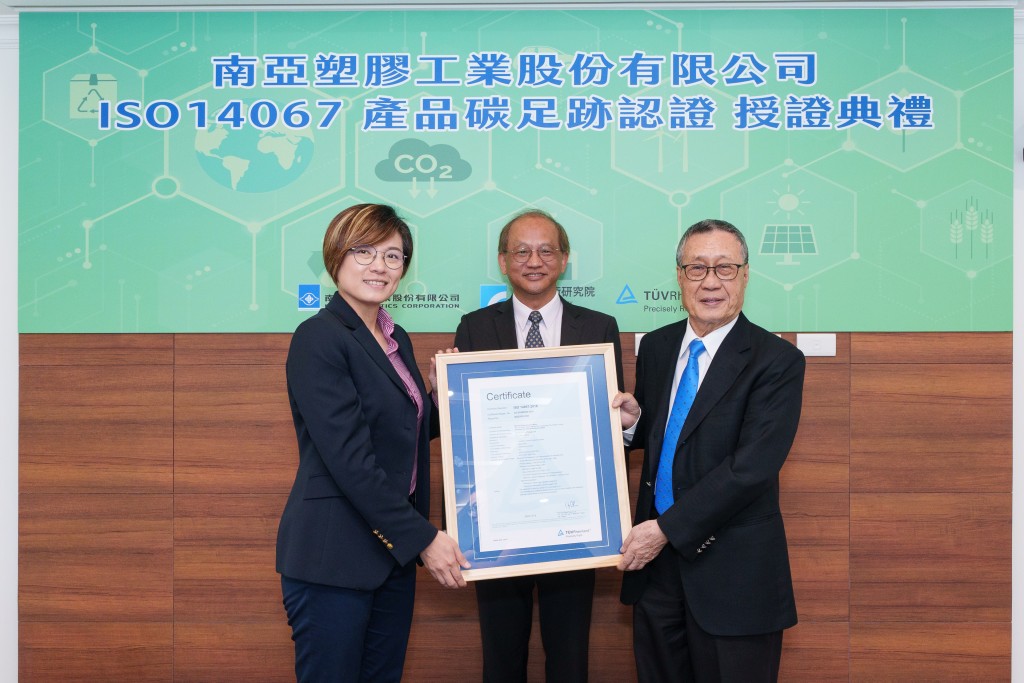
Nan Ya Plastics is now promoting the ISO 14067 product carbon footprint standard in response to the global trend toward carbon reduction. The greenhouse gas (GHG) emissions of applicable products were examined in detail at each phase from raw materials to production to obtain a full picture on their actual carbon emissions and carbon emission hotspots, with this information then used as a reference for the development of carbon reduction plans. The carbon footprints of 13 products from Nan Ya were recently verified by TÜV Rheinland with the help of the Green Energy and Environment Research Laboratories (GEL) at the Industrial Technology Research Institute (ITRI).
Nan Ya products involved in this latest audit spanned multiple industries, including “plastics processing,” “chemical engineering,” “polyester fiber,” and “electronic materials.” Every phase from raw materials, manufacturing and transportation processes, to end products had to be thoroughly examined. The full audit program was very complex and challenging to coordinate, as it spanned plants, business units, and upstream/downstream products. The 13 industrial products that received their carbon footprint verifications this time included engineering plastics PBT, thermoplastic polyurethane, glazed fiberglass door, phthalic anhydride, 1,4-butanediol, ethylene glycol, polyester release film, copper foil, glass yarn, glass fabrics, BPF epoxy resin, copper clad laminate, and cast resin transformer. Third-party verification was carried out by TÜV Rheinland to ensure the validity of related data. Nan Ya has been actively assisting the Ministry of Environment in formulating Product Category Rules (PCR) for product carbon footprints. PCR will become the key standard used by the Ministry of Environment when reviewing applications for product carbon footprint labeling from the plastics industry.
Despite the audit team’s familiarity with industry processes and its extensive industry experience, the sheer complexity of the industrial production processes still made calculating the distribution of substance and information flows in every phase from raw materials and manufacturing to disposal extremely challenging. Until an inventory is carried out, different units within the same company may be using different units of calculation for the same material. Consolidating and ensuring consistency of data was an endeavor in itself. “For example, the carbon footprint calculations for raw materials in the same bottle of water may vary for products from different plants,” says Ryan C. C. Hsiang, Manager of Systems, TÜV Rheinland. “Such differences reflect variances in the operations and record-keeping of different units.” During the audit, Nan Ya, ITRI, and TÜV Rheinland had to constantly compare and break down discrepancies that kept cropping up during the verification process. All 13 product carbon footprint certificates were only awarded when the results were fully harmonized. At the same time, GEL’s “Sustainable Carbon Management Platform” carbon footprint calculation and carbon footprint verification report generation functions were also adopted across the board by the Nan Ya Group. The platform ended up playing a key role, as it allowed for rapid correction of identified deficiencies and greatly shortened the document revision time.
Four main carbon reduction strategies have been adopted by Nan Ya to realize its energy efficiency and carbon reduction targets -- low-carbon energy transformation, energy-efficient and low-carbon circular economy, increase of renewable energy usage, and application of carbon capture technology. By following these strategies, Nan Ya hopes to reduce the carbon content of products and increase their recyclability through cross-plant integration of resources and material homogeneity in design. The results from the latest carbon footprint inventory for 13 raw materials conducted simultaneously by Nan Ya will not only serve as a guide for further improvements in product carbon reduction in the future but also inspire internal dialog and set a benchmark for the rest of the industry.
TÜV Rheinland, one of the leaders in carbon and energy management verification, is accredited as a certification body by the Ministry of Environment and Water Resources Agency. TÜV Rheinland has been closely monitoring issues relating to global carbon and carbon management since 2009. It also provides services relating to organizational GHG inventory verification (ISO 14064-1), product carbon footprint verification (ISO 14067), water efficiency management (ISO 46001), and energy management system verification (ISO 50001). TÜV Rheinland assists local and overseas enterprises respond to the requirements of their customers and local regulators by strengthening their overall green corporate competitiveness from energy management and supply chain cooperation to waste recycling.
